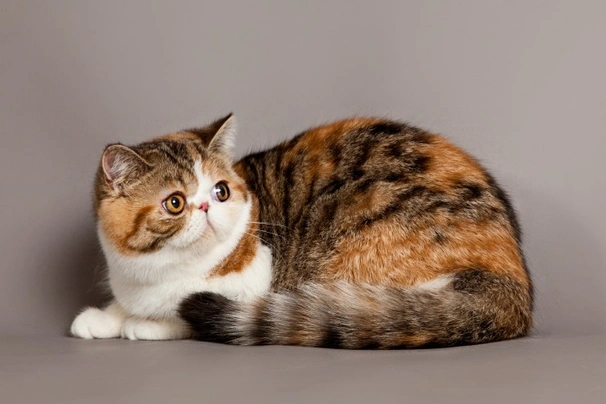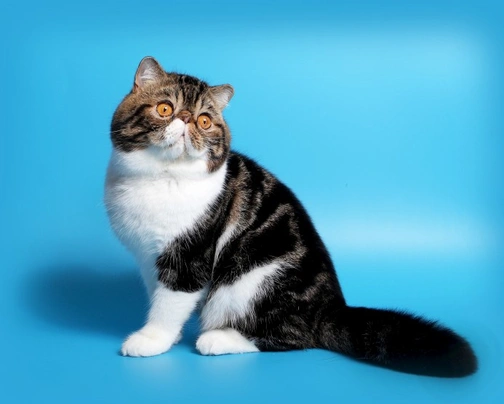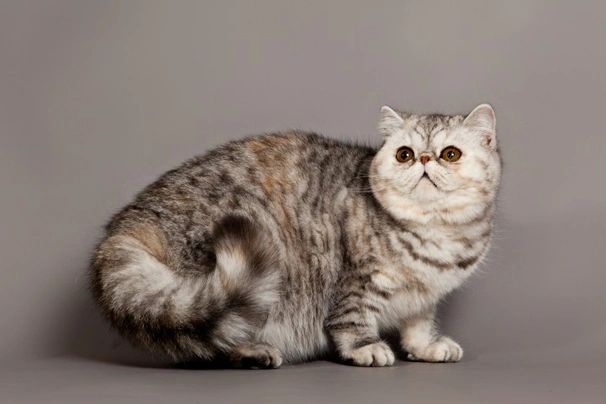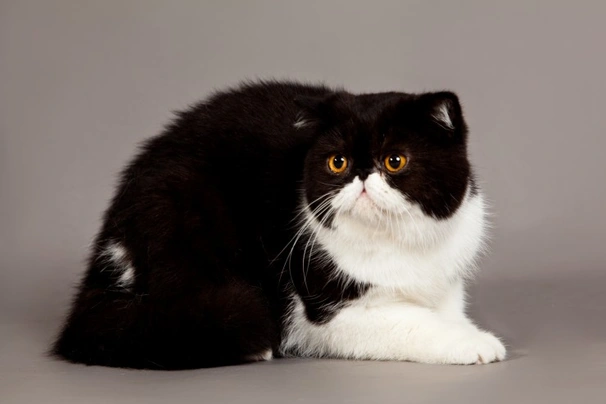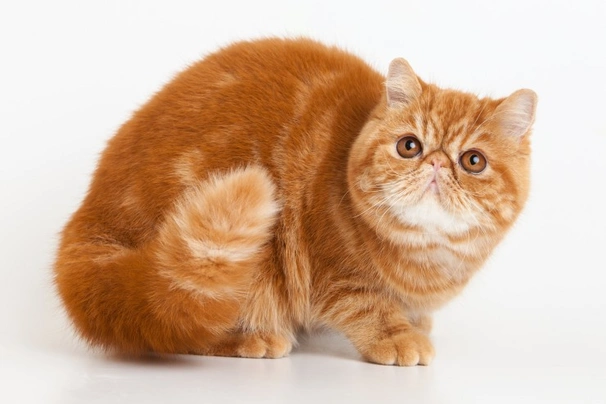Exotic
Introduction of the Exotic
The Exotic is often referred to as being a shorthaired Persian thanks to the fact they look so similar with the main difference being in the length of their coats. They are relatively new to the cat scene having first been developed in the States. However the Exotic has found a big fan base in the UK thanks to their adorable looks their kind loving albeit mischievous natures and their lovely luxurious coats.
History of the Exotic
The Exotic was first developed in the United States in the fifties by crossing Silver Persians to American Shorthairs. The breed was exhibited both in 1967 and 1968 with the first crosses to be shown being American Shorthairs and Persians Russian Blues and Persians and Burmese. However a few years later in 1975 it was decided the only acceptable outcrosses would be to Persian and American Shorthairs. Later in 1987 this was yet again changed with only Persians and Exotics being allowed.
The first Exotic to arrive on British shores was called Gr Ch Purrfin My Main Man he was a descendant of a cross between a Burmese and Persian. The breed was recognised by the GCCF in 1986 but was only granted full Championship status a few years later in 1995. Today these lovely cats have found their way into the hearts and homes of many people the world over thanks to their charming looks and their kind loyal albeit mischievous natures.
Appearance of the Exotic
The Exotic looks very much like a Persian with the only real difference being they have much shorter and denser coats. They also boast having extremely sweet faces with massive eyes and short noses. Because they have short square bodies this gives them a teddy-bear like appearance which makes the Exotic all the more endearing.
Their heads are large and round with a good width to their skulls. They have small ears with rounded tips that are set well apart and quite low on a cat's head. Cheeks are full and foreheads are nicely rounded which adds to an Exotic’s sweet appeal. Their noses are broad and very sort and which boast a stop. Noses are nicely formed and chins are strong. They have powerful broad jaws and thick short necks. Their eyes are a brilliant colour very large and set nicely apart on a cat's face.
They have medium or large size bodies that are quite cobby in appearance. Chests are broad and deep with cats having very large well-muscled shoulders and rumps. Legs are short strong and thick with cats having rounded large paws with tight toes. Cats have five toes on their front feet but only four on their back ones. Their tails are short but nicely in proportion to the rest of a cat's body.
When it comes to their coat the Exotic boasts having a thick plush and soft to the touch coat that stands well off from their body thanks to the fact the hair is so dense. Their coats are medium in length but the hair is not so long that it flows. Exotics come in a variety of colours which includes seven solid colours which are as follows:
- White
- Blue
- Black
- Red
- Cream
- Chocolate
- Lilac
On top of this Exotics can be the following colours too:
- Silver
- Golden colours of chinchilla
- Shaded or golden and blue chinchilla
- Blue Shaded silver or golden
Other colour variations include the following:
- Shaded
- Smoke
- Tabby
- Calico
- Particolour
- Bicolour
Exotics can also boast having various pointed patterns and markings of the Himalayan and their eyes match their coat colour.
Temperament of the Exotic
The Exotic is a playful affectionate and gentle cat that loves nothing more than to be sitting on an owner's lap. They do however boast a bit of a mischievous side to their natures which makes them all the more endearing and why they have gained such a big fan base here in the UK and elsewhere in the world. They crave human contact and will follow their owners from room to room just to be with them. As such they are best suited to families where at least one person stays at home when everyone else is out so they are never left on their own for too long.
Like their Persian cousins they are intelligent and learn new things very quickly which includes playing "fetch" retrieving toys for owners with great enthusiasm before curling up on a nice warm lap. With this said Exotics don't tend to do much in a hurry preferring to take their time about things. They are renowned for being among the most affectionate and loving breeds around which is one of the reasons they make such wonderful family pets and companions.
Intelligence / Trainability of the Exotic
The Exotic is an intelligent cat although they do like to do things at their own pace which means they never do anything in much of a hurry. As such it often seems like they prefer to ignore an owner. With this said as soon as an owner sits down they will find a furry friend on their lap. Exotics like to lounge around as much as they can which is why it's so important to keep an eye on their food intake and their waistlines.
Children and other
Exotics with their easy going affectionate personalities are the perfect choice for families with children and this includes toddlers. They are very calm cats by nature and they get on with everyone. However any interaction between toddlers and a cat should always be well supervised by an adult to make sure things stay nice and calm. With this said children need to be taught how to behave around cats and when to leave them alone.
They also get on well with dogs especially if they have grown up together. However care has to be taken when introducing an Exotic to a dog they don't already know just in case the dog does not get on with their feline counterparts. They are incredibly social and easy going by nature and have been known to get on with other pets and smaller animals. However it's always wiser to keep a close eye on any cat when they are around smaller pets just in case.
Health of the Exotic
The average life expectancy of an Exotic is between 12 and 15 years when properly cared for and fed an appropriate good quality diet to suit their ages.
The Exotic is known to suffer from a few hereditary health issues which are worth knowing about if you are planning share your home with one of these easy going cats. The conditions that seem to affect the breed the most include the following:
- Feline polycystic kidney disease (PKD) - breeders should have stud cats DNA tested
Caring for the Exotic
As with any other breed Exotics need to be groomed on a regular basis to make sure their coats and skin are kept in top condition. On top of this cats need to be fed good quality food that meets all their nutritional needs throughout their lives which is especially true of kittens and older cats.
Grooming of the Exotic
The Exotic boasts having a dense coat that lies well away from the body and as such they need to be brushed on a regular basis only not quite as much as their longer haired Persian cousins. A twice weekly brush is all it takes to keep their coats in good condition and to remove dead and loose hair. Like other breeds they tend to shed the most in the Spring and then again in the Autumn when more frequent brushing is usually necessary to keep on top of things.
Their eyes need to be gently wiped from time to time to remove any build-up at the inner corners which does tend to happen more frequently in Exotics than other breeds. It's also important to check a cat's ears on a regular basis and to clean them when necessary. If too much wax is allowed to build up it can lead to a painful infection which can be hard to clear up. In short prevention is often easier than cure with ear infections. Cats often suffer from ear mites which can be a real problem which is why it's so important to check their ears on a regular basis which means catching the problem early.
Exercise of the Exotic
The Exotic is known to be an easy going character and one that likes to take life at their own pace. With this said they love to play interactive games like "fetch" in between snuggling up on an owner's lap. They will happily snooze the day away if they are allowed to which is why it's important to keep an eye on their food intake and their waistline.
Cats that are kept as indoor pets need to be given lots of things to do and places to hide when they want to bearing in mind that Exotics love to snuggle up for a snooze when the mood takes them and cat napping during the day is one of their favourite pass times.
Feeding of the Exotic
If you get an Exotic kitten from a breeder they would give you a feeding schedule and it's important to stick to the same routine feeding the same kitten food to avoid any tummy upsets. You can change a kitten's diet but this needs to be done very gradually always making sure they don't develop any digestive upsets and if they do it's best to put them back on their original diet and to discuss things with the vet before attempting to change it again.
Older cats are not known to be fussy eaters but this does not mean they can be given a lower quality diet. It's best to feed a mature cat several times a day making sure it's good quality food that meets all their nutritional requirements which is especially important as cats get older. It's also essential to keep an eye on a cat's weight because if they start to put on too much it can have a serious impact on their overall health and wellbeing. It can shorten a cat's life by several years if they carry too much weight.
Exotic price
If you are looking to buy an Exotic you would need to pay anything from £300 to well over £600 for a well-bred pedigree kitten. The cost of insuring a male 3-year-old Exotic in northern England would be £12.47 a month for basic cover but for a lifetime policy this would set you back £27.04 a month (quote as of Sept 2016). When insurance companies calculate a pet's premium they factor in several things which includes where you live in the UK a cat's age and whether or not they have been neutered or spayed among other things.
When it comes to food costs you need to buy the best quality food whether wet or dry making sure it suits the different stages of a cat’s life. This would set you back between £15 - £20 a month. On top of all of this you need to factor in veterinary costs if you want to share your home with an Exotic and this includes their initial vaccinations their annual boosters the cost of neutering or spaying a dog when the time is right and their yearly health checks all of which quickly adds up to over £500 a year.
As a rough guide the average cost to keep and care for an Exotic would be between £30 to £50 a month depending on the level of insurance cover you opt to buy for your dog but this does not include the initial cost of buying a well-bred kitten.

Pedigree Exotic Kittens boys ready NOW
£950
Registered superb cuddly female
£1,150
